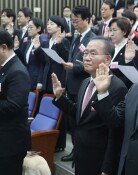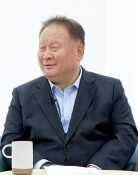Korea faces serious brain drain
According to the annual Brain Drain Index published by Switzerlands IMD management school, Korea is a country suffering one of the worst brain drains. Of particular concern is that an increasing number of highly skilled science and engineering talents with master`s and doctoral degrees are leaving the country.
Masters or Ph.D.s in science and engineering mostly prefer studying in the U.S., and choose to stay there once they leave Korea. Korea`s research conditions are under-developed and economic and social support environment for highly skilled people far lag behind advanced countries.
According to a survey on the international liquidity of U.S. doctoral degree holders in 2008 conducted by the U.S.-based National Science Foundation Network, 54 percent of Koreans who obtained Ph.D. in science, technology and healthcare in the U.S. remained there while 44 percent returned to Korea.
Science and Technology Policy Institute of Korea has been surveying science and engineering manpower in-and-outflow trends every three years since 2006, and its survey shows 10,866 graduate students in science and engineering went abroad in 2006, and 12,240 in 2011, an annual average increase of 2.4 percent. They chose to go abroad due to high academic levels and decent research conditions.
Bae Yeong-chan, professor of chemical and bio engineering at Hanyang University, who served as a policy advisor to National Science and Technology Council, points out three reasons for the serious outflow by science and engineering talents: students` rising expectations, few workplaces in Korea, and lagging research environment that supports creativeness.
Bae said improving research environment was the most urgent. He said, "In many cases, researchers who return home feel skeptical on Korea`s research environment," adding, "The government`s approach to increase research spending and facilities to prevent brain drain, in other words, a policy to solve the issue with money, can`t help improve research culture." Bae argued that in order to improve the culture in the short term that foreigners should be nominated as heads of 28 government-funded research institutions and science and technology specialized universities, so that Korea`s closed science sector culture is reformed while eradicating a practice of strict hierarchy.
Students studying overseas also support this idea according to brain drain survey of science and engineering majors.
People in science and engineering master`s and doctoral programs studying in the U.S. and Japan responded they are opting to stay abroad due to high academic and technological levels, good monetary terms, and working environment and research conditions that guarantee autonomy and independence.
Hiring conditions at home for outstanding talents is also a problem. Professor Lim Shin-hyeok of bio science at Gwangju Institute of Science and Technology said, "The regular positions for post-doctoral researchers who studied abroad can be found in government-funded research institutes and corporate research institutes, since becoming professors at universities is extremely difficult. However, government-funded research institutes have frozen the number of employees and corporate institutes opt not to hire if research areas don`t match."







